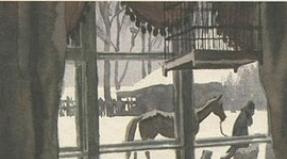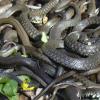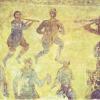Vladimir Mayakovsky - And you could: Verse. "Could you?" V. Mayakovsky Mayakovsky I immediately greased
Read the verse "Could you?" Mayakovsky Vladimir Vladimirovich is available on the website. Written in the early period of creativity (1913), the poem reflects the position of the author, who seeks to declare a new word in art. Although the topic is not new: the deep demarcation of the poet and the crowd, the confrontation between the philistine and the creator, Mayakovsky reveals it with the help of innovative ways, fresh form, offering his vivid, imaginative perception of the world and comparing it with the dull everyday.
The poem "Could you?" - a challenge to everything familiar, monotonous like "everyday life", repeated after an equal period of time. However, this gray everyday day can be changed in the poet's imagination in the same way as the usual contours of a geographical map. They can be erased, blurred, smudged by splashing another paint on the card from a glass. In the perception of a down-to-earth layman, jelly is a trembling mass on a porcelain dish, the poet's eye saw on it the "slanting cheekbones of the ocean", and the fish scales for him are "the call of new lips." The juxtaposition is unexpected and non-standard. The poet avoids templates, which in his perception are the personification of everything inert, materialistic and grounded. But in order to see this, you need to be able to notice poetry in what is usually and everyday and be surprised at what the other will leave indifferent. Only a romantic can hear the sounds of a flute in the simple murmur of a drainpipe, and a poet, using verbal forms, can play a nocturne on it.
In search of new futuristic forms, Mayakovsky created works that met with mixed reviews from his contemporaries. But according to Pasternak, the poet cannot be denied skill and “proud democracy”. The text of Mayakovsky's poem "Could you?" can be downloaded in full on the website or taught online in a literature lesson in the classroom.
"Could you?" Vladimir Mayakovsky
I immediately blurred the map of everyday life,
splashing paint from a glass;
I showed on a platter of jelly
slanting cheekbones of the ocean.
On the scales of a tin fish
I read the calls of new lips.
And you
nocturne play
we could
on the downspout flute?
Analysis of Mayakovsky's poem "Could you?"
The poetry of Vladimir Mayakovsky is particularly sharp and straightforward. However, in the literary heritage of this author, sometimes there are works that have amazing imagery, metaphoricity and are not devoid of a kind of romance. These include, in particular, the poem "Could you?", Written in 1913 and conveys the author's special, carefree and upbeat mood.
In a few capacious phrases, Vladimir Mayakovsky describes a gray and everyday picture of an ordinary meal with a classic set of dishes. However, as if by magic, it is transformed, since the poet is able to see the "slanting cheekbones of the ocean" in the banal jelly. His desire to embellish the world is so great that all kinds of objects that are at hand are used.
So, succumbing to a romantic mood, the poet from the very first line declares that he “immediately blurred the map of everyday life,” hinting that he is annoyed by the routine in everything, even when it comes to an ordinary dinner. Further, the poet allows himself an obviously hooligan trick, "splashing paint from a glass." The spilled drink allows Vladimir Mayakovsky, if not to transform the world around him, then at least to make some changes to it, to revive the dull drinking landscape and try to find in it grains of joy, celebration, a kind of magical charm.
His romantic impulse is so fast-paced and exciting. that even in ordinary fish scales the poet sees "the calls of new lips." Every thing and every dish literally transforms under the gaze of the author, acquiring a new meaning and revealing its secrets. And in this impetuous comprehension of a new, still unknown world, which is hidden under the mask of dullness and indifference, Vladimir Mayakovsky sees an amazing harmony that fills his heart with joy and a kind of childish delight. Therefore, it is not surprising that, in a fit of inspiration, he turns to an unknown interlocutor, or, more precisely, to all readers, with the question of whether they could play a nocturne on a "drainpipe flute"?
The question itself sounds very poetic, sublime and romantic. However, the author is convinced that the people around him will understand what is at stake. After all, it is enough just to take a closer look at the objects around us to see a mysterious charm in them. The main thing is to want in your soul to transform this gray and unremarkable world, consisting of platitudes and conventions. And this is exactly what the poet proposes to do in the hope that in this way he will be able to find like-minded people who, as he assumes, will appreciate the amazing gift that he throws at their feet. It consists in the ability to transform the world in accordance with one's desires and sensations, to see not only the outer shell of things, but also their essence, to unravel their secrets and read them like a fascinating book.
However, despite the fact that the poem "Could you?" written in a very sublime major key, in bright and figurative phrases, loneliness, from which the poet suffers, appears. He cannot find understanding among the people who surround him, therefore he comes up with fun in the form of a search for non-existent images. Dressed in poetic lines, they become available to each of us and seem to bring us closer to the poet, causing some surprise. After all, hardly anyone in the daily hustle and bustle would come up with the idea to look for something sublime and romantic among the ordinary and prosaic. However, Vladimir Mayakovsky makes you reconsider your attitude to little things, which allows people to become happier, kind and optimistic.
Could you?
~~~*~~~~*~~~~*~~~~*~~~~*~~~~
I immediately blurred the map of everyday life,
splashing paint from a glass;
I showed on a platter of jelly
slanting cheekbones of the ocean.
On the scales of a tin fish
I read the calls of new lips.
And you
nocturne play
we could
on the downspout flute?
1913 g.

Description
Written in the early period of creativity (1913), the poem "Could you?" reflects the position of the author, who seeks to declare a new word in art. Although the topic is not new: the deep demarcation of the poet and the crowd, the confrontation between the philistine and the creator, Mayakovsky reveals it with the help of innovative ways, fresh form, offering his vivid, imaginative perception of the world and comparing it with the dull everyday.
The poem "Could you?" - a challenge to everything familiar, monotonous like "everyday life", repeated after an equal period of time. However, this gray everyday day can be changed in the poet's imagination in the same way as the usual contours of a geographical map. They can be erased, blurred, smudged by splashing another paint on the card from a glass. In the perception of a down-to-earth layman, jelly is a trembling mass on a porcelain dish, the poet's eye saw on it the “slanting cheekbones of the ocean”, and fish scales for him - “the call of new lips.” The comparison is unexpected and non-standard. The poet avoids templates that, in his perception, are personification But in order to see this, you need to be able to notice poetry in what is usually and everyday and be surprised at what the other will leave indifferent. , play a nocturne on it.
In search of new futuristic forms, Mayakovsky created works that met with mixed reviews from his contemporaries. But according to Pasternak, the poet cannot be denied skill and "proud democracy."
Analysis of the poem "Could you?" Mayakovsky
Brief analysis
History of creation - the poem was written in 1913, a year after the creative dawn of the poet rose.
The theme of the poem is the beauty of human everyday life.
Composition - The poem is a monologue-appeal of the lyrical hero to others. The hero's story is not divided into parts by meaning. The author, like beads, string together wonderful associations that evoke everyday things in him. The work is not divided into stanzas.
The genre is civic lyrics.
Poetic meter - iambic tetrameter, ABAB cross rhyme.
Metaphors - "I immediately smeared the everyday card, splashing paint from a glass", "slanting cheekbones of the ocean", "calling new lips", "flute of drainpipes."
Epithets - "tin fish", "new lips".
The creativity of V. Mayakovsky is different: most of his poems are striking in their sharpness, but there are also poems that are remembered in high spirits. We suggest that you familiarize yourself with a brief analysis "Could you?" according to plan. At school, it is studied in grade 10.
History of creation
V. Mayakovsky came to literature in 1912, after he published the poem "Night". In the same period, the poet joined the Futurists and devoted himself to the art of poetry. This is how the story of the creation of the analyzed poem and other masterpieces of the famous Russian futurist began. "Could you?" was written in 1913, refers to the early work of the poet. It is known that the life of the young Mayakovsky was not easy, apparently, the sad experience taught the poet to notice beauty in simple things.
Topic
In the lines of the analyzed poem, the theme of the beauty of the surrounding world is revealed. In connection with it, the idea is realized that a person decides for himself how to perceive the world: as gray everyday life or as a bright inspiring reality.
The work is written in the first person, which helps to subtly feel the mood of the author. In the center of the verse is a lyrical hero who is perceived by the reader as an incorrigible optimist. Already in the first lines, he tells how he painted the gray everyday life with “paint from a glass”. This phrase should be taken figuratively. Most likely, it is said that the hero brightened up everyday life with something that pleases his soul.
The man did not stop at coloring. In the jelly, he noticed the ocean, and the tin fish beckoned with his lips. The lyrical hero notices every detail. The associations that arise in his head are somewhat unusual. Nevertheless, the hero is not afraid to seem like an eccentric to the surrounding. On the contrary, he is proud of his ability to see beauty.
In the last lines, the hero addresses other people. He asks if they also know how to see beauty in gray everyday life. This question is hidden behind the original metaphor: "Could you play a nocturne on a drainpipe flute?" The question, at first glance, is rhetorical. In fact, the author hopes that each reader will give his own answer.
Composition
Despite the fact that the poems are written in the spirit of futurism, its composition is simple. This is a monologue of a lyrical hero who talks about his perception of the gray everyday life. He string together metaphorical images, and then appeals to those around him. According to the meaning, the verse is not divided into parts. The author also does not use formal division into stanzas, which gives integrity to thoughts.
genre
The genre of the analyzed work is civic lyrics. The poetic meter is iambic tetrameter. V. Mayakovsky uses the ABAB cross rhyme. The poem contains both male and female rhymes.
Expression tools
Creativity of futurists surprises with fresh, original images, complex associations, experiments with form. The analyzed poem is a vivid example of these features of the trend popular at the beginning of the twentieth century. The artistic means used by Mayakovsky allow the author to convey the inner state of the lyrical hero.
Each of the images created by the poet is metaphorical: “I immediately smeared the everyday card by splashing paint from a glass”, “oblique cheekbones of the ocean”, “calling new lips”, “flute of drainpipes”. Mayakovsky does not betray himself, therefore his metaphors are somewhat crude. The picture is supplemented with epithets, but there are not many of them in the text: "tin fish", "new lips". There are no comparisons in the text.
Expression tools help the author to fully reveal the topic and convey the idea to the readers. The rigidity of the lines is given by the alliteration of the consonants "w", "h", "w", "c": "On the scales of a tin fish I read the calls of new lips." Mayakovsky loves to play with intonation, but the analyzed verses are distinguished by calm narrative sentences, only at the end an interrogative sentence appears.
Analysis of the poem "Could you" by Mayakovsky
Mayakovsky's verse "Could you ..." most vividly reflects his original talent as a poet-futurist. It was written in 1913 and is one of the first serious statements by the author about himself.
The poem is small in size, but at the same time oversaturated with complex semantic constructions. It begins with a proud demonstration of the author's "I". Mayakovsky was distinguished by his rebellious character, he was characterized by extreme individualism and a tendency to unusual extravagant antics that shocked others. The speed and uncompromising nature of the action is emphasized by the word “at once”. The lyrical hero draws a sharp line between himself and the ordinariness of the world around him. He intends to decisively transform the dullness of "everyday life".
Complex metaphors ("a dish of jelly", "slanting cheekbones of the ocean") used by the author are difficult to comprehend. According to classical concepts, they should mean the transfer of the properties of one object to another on a common basis. But Mayakovsky creates metaphors completely arbitrarily, exclusively according to his own ideas. It does not take into account the similarity of objects, but is based on the effect produced.
The work is based on the usual everyday process of eating. The author seeks to magically illuminate this action, paint it with bright colors. Opposing himself to the gray mass, the lyrical hero creates his own unique world, where “on the scales of a tin fish” one can read “the calls of new lips”.
In the closing lines, Mayakovsky addresses a rhetorical question to readers. Its paradoxicality makes the answer known in advance. "Nocturne ... on the flute of drainpipes" will not be played by anyone. Only the author is confident in his limitless possibilities. A rich imagination and the ability to always “swim against the tide” is the key to his confidence.
Mayakovsky believed that everything is subject to him, there are no boundaries and limits. But in a proud and self-confident tone, the poet's longing from loneliness is felt. The final question is also an attempt to find like-minded people. The poet despised bourgeois society for the lack of imagination and vulgar philistinism. This feeling later made him an ardent supporter of the revolution, the slogan of which was the complete destruction of the old world and the construction of an absolutely new society. This desire, in turn, led to the poet's disappointment with the Soviet regime, when he realized that he was still a loner, and the people in the mass had not changed at all.
I immediately blurred the map of everyday life,
splashing paint from a glass;
I showed on a platter of jelly
slanting cheekbones of the ocean.
On the scales of a tin fish
I read the calls of new lips.
And you
nocturne play
we could
on the downspout flute?
Analysis of the poem "Could you" by Mayakovsky
Mayakovsky's verse "Could you ..." most vividly reflects his original talent as a poet-futurist. It was written in 1913 and is one of the first serious statements by the author about himself.
The poem is small in size, but at the same time oversaturated with complex semantic constructions. It begins with a proud demonstration of the author's "I". Mayakovsky was distinguished by his rebellious character, he was characterized by extreme individualism and a tendency to unusual extravagant antics that shocked others. The speed and uncompromising nature of the action is emphasized by the word “at once”. The lyrical hero draws a sharp line between himself and the ordinariness of the world around him. He intends to decisively transform the dullness of "everyday life".
Complex metaphors ("a dish of jelly", "slanting cheekbones of the ocean") used by the author are difficult to comprehend. According to classical concepts, they should mean the transfer of the properties of one object to another on a common basis. But Mayakovsky creates metaphors completely arbitrarily, exclusively according to his own ideas. It does not take into account the similarity of objects, but is based on the effect produced.
The work is based on the usual everyday process of eating. The author seeks to magically illuminate this action, paint it with bright colors. Opposing himself to the gray mass, the lyrical hero creates his own unique world, where “on the scales of a tin fish” one can read “the calls of new lips”.
In the closing lines, Mayakovsky addresses a rhetorical question to readers. Its paradoxicality makes the answer known in advance. "Nocturne ... on the flute of drainpipes" will not be played by anyone. Only the author is confident in his limitless possibilities. A rich imagination and the ability to always “swim against the tide” is the key to his confidence.
Mayakovsky believed that everything is subject to him, there are no boundaries and limits. But in a proud and self-confident tone, the poet's longing from loneliness is felt. The final question is also an attempt to find like-minded people. The poet despised bourgeois society for the lack of imagination and vulgar philistinism. This feeling later made him an ardent supporter of the revolution, the slogan of which was the complete destruction of the old world and the construction of an absolutely new society. This desire, in turn, led to the poet's disappointment with the Soviet regime, when he realized that he was still a loner, and the people in the mass had not changed at all.
Could you?
I immediately blurred the map of everyday life
splashing paint from a glass;
I showed on a platter of jelly
slanting cheekbones of the ocean.
On the scales of a tin fish
I read the calls of new lips.
And you
nocturne play
we could
on the downspout flute?
V. Mayakovsky
What's this? I often had a question. And one day, suddenly I saw a plot.
Young man. In love. Unrequited. There are options here though. But consider this one for now.
There is no hope. I'm tired of all. This is the card of everyday life.
Where to go? To a restaurant, I guess.
There is a dish of jelly and paint in a glass.
After such a paint on a platter of jelly, you can easily see at least oblique, at least some other cheekbones. Even the ocean. Ocean. Romance. Sail. Element. Eternity. And what about some eccentric girl there?
By the way, in those days, the restaurant menu was also called a card.
A huge sign in the shape of a tin fish is visible from the window on the opposite building. Yes, even if there is an abyrvalg in this building. Never mind. And fish straight from that very ocean.
The poet is in love. The fish scales appear as inviting lips. A lot of them. But it looks great.
And they are calling. Your name is! Here you can add more paint.
Rain is making noise in the drainpipes. And the poet wants to hear the nocturne. And hears him. This is playing.
Could you? - the title of the poem.
The poet could.
And I would like to. Maybe I can someday.
And another option - mutual love - perhaps next time.
Reviews
Good day!
Perfect alignment! I love the work of V.V. Mayakovsky, but this work is especially catchy!
I, of course, lean more towards the second option, because all such lyrics are from unrequited love.
Thanks!
The Poems.ru portal provides authors with the opportunity to freely publish their literary works on the Internet on the basis of a user agreement. All copyrights for works belong to the authors and are protected by law. Reprinting of works is possible only with the consent of its author, to whom you can refer on his author's page. Authors bear responsibility for the texts of works independently on the basis of



















